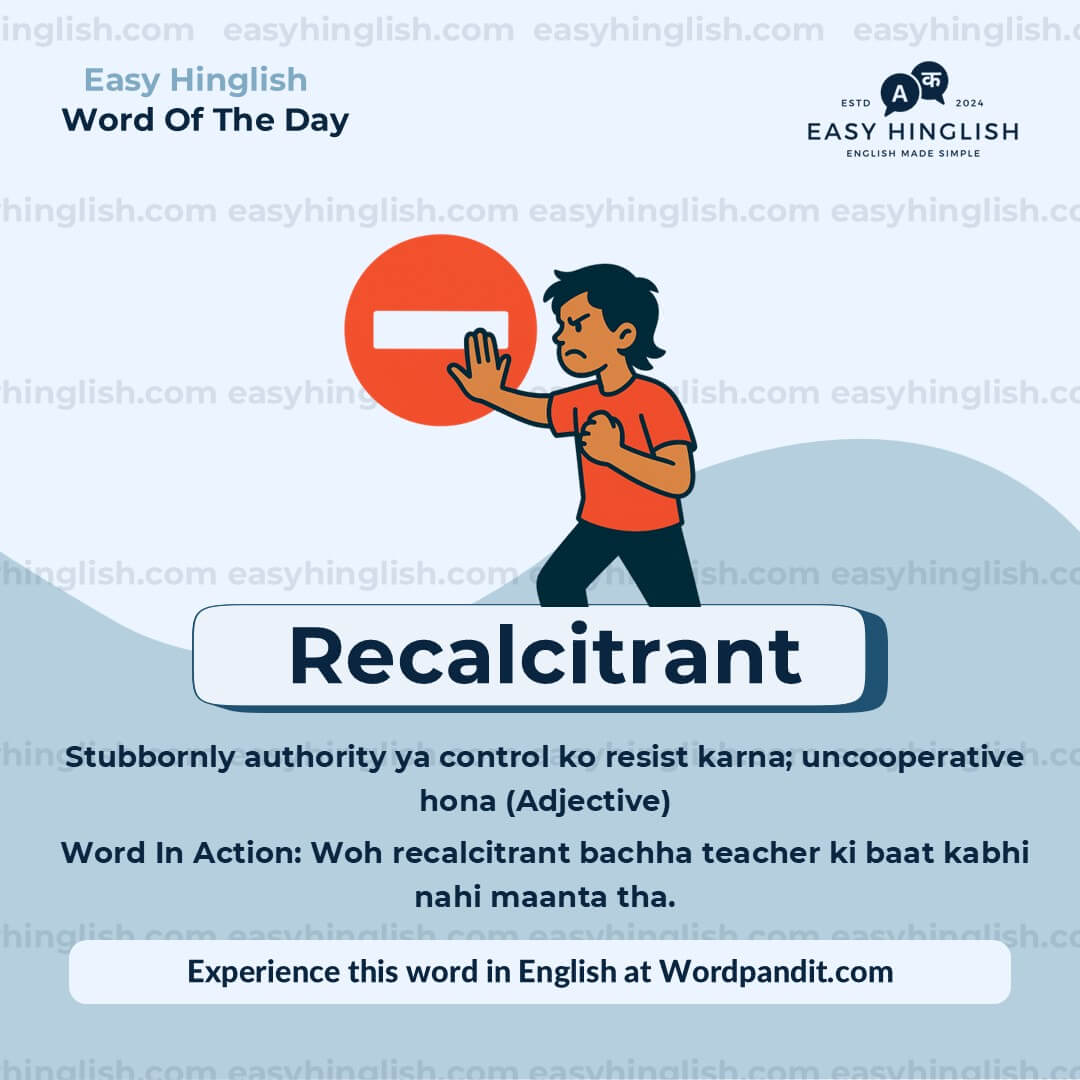Daily Vocabulary International Newspapers aur Publications se Seekho
Wordpandit ke Global Vocabulary Hub ke Saath Apni Vocabulary Expand Karo
Wordpandit par, hum aapko ek truly global vocabulary develop karne me madad karte hain, jo duniya ke sabse respected international publications se li gayi hoti hai. Yeh section aapko naye words se introduce karne ke liye design kiya gaya hai jo global conversations aur trends ko define karte hain.
Global Sources ka Power
Aapko globally sochne aur communicate karne me madad dene ke liye, hum vocabulary curate karte hain world ke top international sources se, jaise:
- The New York Times
- The Washington Post
- BBC
- The Guardian
- The Economist
- Scientific American
- Psychology Today
- Aur bhi bahut saare...
Globally Socho, Competitively Seekho
Hamare daily updates se aap international publications ke naye words seekhoge jo global news aur developments se jude hote hain. Isse aapki vocabulary current bhi rahegi aur globally relevant bhi.
Apni Global Soch Ko Expand Karo
Agar aap international exams ki tayari kar rahe ho, global business communication me excel karna chahte ho, ya sirf apni language skills improve karna chahte ho, toh Wordpandit aapko global level pe grow karne ke liye best resources provide karta hai.
Smart Learning, Global Reach
Hamari learning methodology me global examples, memory aids, aur interactive activities shamil hain, jo naye words ko effectively yaad karne aur real-world me use karne me madad karti hain.
Aaj Hi Apni Global Vocabulary Journey Shuru Karo!
Wordpandit Kyun Choose Karein?
Practical Learning: Aise words seekho jo real-world reading aur communication me aapko sach me kaam aayenge, taaki aapki comprehension aur bolne ki skills improve ho.
Diverse Content: Current affairs se lekar scientific breakthroughs tak, hamare different sources aapko multiple domains ki vocabulary seekhne ka moka dete hain.
Effortless Integration: Wordpandit ko apni daily routine ka part banao. Sirf kuch minute har din dene se aapki vocabulary time ke saath kaafi improve ho sakti hai.
Vocabulary Mastery Tak Ka Aapka Safar
- Regularly hamare Daily Vocabulary section ko visit karo
- Naye words explore karo aur unka context me use samjho
- In words ko apni writing aur bolne ki practice me use karne ki koshish karo
- Jaise-jaise aapke words badhte hain, apni progress ko track karo
Aaj Hi Apni Vocabulary Journey Shuru Karo!
Wordpandit ke saath vocabulary improve karna start karo. Roz thoda effort dalne se aap ek strong vocabulary develop kar sakte ho jo academic, professional, aur personal life me kaafi kaam aayegi.
Yaad rakho, ek naya shabd roz seekhna linguistic limitations ko door karne ka best tareeka hai! Wordpandit ko apni daily learning journey ka sathi banao aur vocabulary excellence ki taraf badho!
WORD-1: Averted
Sandarbh (Context):
"If the sentence is about a crisis, disaster, or conflict, 'averted' likely means 'prevented'." - Aeon
Vyakhya (Explanatory Paragraph):
Averted ka matlab hai "kisi buri cheez ko hone se rokna ya kisi cheez se nazar hatana." Yeh word tab use hota hai jab disasters, crises, conflicts ya dangerous situations ko nuksaan karne se pehle hi rok diya jaye. Averted kaise use karte hain yeh context par depend karta hai—yeh ya toh kisi negative cheez ko prevent karna hota hai ya phir apni aankhen ya dhyan kisi cheez se hatana hota hai. Averted ko formal writing, news reports (jahan narrowly avoided catastrophes ka zikr ho), aur competitive exam passages mein use karte hain jab crisis management ya diplomatic interventions ki baat ho rahi ho.
Arth (Meaning): Kisi buri cheez ko hone se rokna; nazar ya dhyan hatana (Verb)
Uccharan (Pronunciation): अ-VUR-टिड (uh-VUR-tid)
Kathinai Star (Difficulty Level): ⭐⭐ Basic se Intermediate
Utpatti (Etymology): Averted Latin word 'avertere' se aaya hai, jo 'a-' (away/door) aur 'vertere' (to turn/mudna) ko combine karta hai. Originally iska matlab tha sirf "turn away karna," lekin word evolve hua aur ab iska sense hai danger ya disaster ko turn away karke use prevent karna. Yeh dual meaning—physical turning away aur metaphorical prevention—aaj bhi modern usage mein hai.
Prashant Sir Ke Tathya (Prashant Sir's Notes):
Bahut students 'averted' ko 'avoided' se confuse karte hain—dono mein prevention involved hai, lekin averted aur avoided mein kya farak hai yeh exam accuracy ke liye crucial hai. Averted ka sahi istemal sentences mein typically serious consequences ya disasters ke liye hota hai jo last moment mein narrowly prevent kiye gaye, jabki avoided zyada general word hai. CAT aur GRE ke students ke liye, jab aap RC passages mein "crisis averted" ya "disaster averted" dekhte ho, toh yeh narrative mein turning point signal karta hai jahan catastrophe intervention se rok diya gaya. Indian newspapers mein, especially political aur economic reporting mein, aapko aksar phrases milenge jaise "war averted through diplomacy" ya "financial crisis averted by RBI intervention"—yeh critical moments indicate karte hain jab disaster ko just in time roka gaya.
Samanarthi & Vipritarthi (Synonyms & Antonyms):
Samanarthi (Synonyms): prevented, stopped, forestalled, deflected, warded off, turned away, diverted, thwarted, avoided, roka gaya
Vipritarthi (Antonyms): caused, invited, encouraged, facilitated, allowed, welcomed
Udaharan (Usage Examples):
- Reserve Bank of India ki timely intervention ne ek major banking crisis averted kar diya jo kai financial institutions ko collapse kar sakti thi.
- Priya ne jaldi se apni aankhen averted kar lein jab woh galti se Bangalore office mein wrong meeting room mein chali gayi.
- India aur Pakistan ke beech diplomatic negotiations ne ek aisi situation averted ki jo full-scale military conflict mein escalate ho sakti thi.
- Ramesh ne disaster avert kar diya company data ko backup karke, sirf kuch ghante pehle jab server crash ho gaya.
Sanskritik Sandarbh (Cultural Reference):
"India ne diplomatic channels aur strategic patience ke through kaafi potential conflicts successfully averted kiye hain." - Indian foreign policy discussions mein common observation
Sochiye (Think About It):
Kya sach mein sabhi crises ko proper planning aur intervention se averted kiya ja sakta hai, ya kuch disasters inevitable hote hain chahe human effort kitna bhi ho?
Chhoti Kriya (Quick Activity):
Teen recent news stories ke baare mein sochiye jahan potential crisis averted hua tha. Har situation ke baare mein ek sentence likhiye jismein 'averted' word correctly use ho.
Yaad Karne Ka Tarika (Memory Tip):
'A-VERTED' ko 'A-VERTICAL turn' ki tarah sochiye—imagine kariye ki aap vertically danger se last second mein turn away kar rahe ho, jaise koi cricketer bouncer ko apne head par aane se avert karta hai. 'Vert' root ka matlab hai 'turn,' toh aap disaster ko strike karne se pehle turn away kar rahe ho.
Vastavik Jeevan Me Upyog (Real-World Application):
Averted commonly journalism, crisis management reports, aur diplomatic communications mein use hota hai jab disaster narrowly prevent ho jaye. Business writing aur formal reports mein, particularly risk assessment documents mein, yeh term tab appear hota hai jab potential problems ko identify karke damage cause karne se pehle hi rok diya jaye. UPSC aspirants ke liye, 'averted' ko samajhna essential hai jab case studies analyze karni ho policy interventions, disaster management, aur governance aur international relations papers mein conflict resolution ke baare mein.
WORD-2: Encampment
Sandarbh (Context):
"University students established an encampment to press their demands for institutional reform." - Washington Post
Vyakhya (Explanatory Paragraph):
Encampment ka matlab hai "ek temporary camp ya settlement, jo aksar kisi specific purpose ke liye establish kiya jata hai jaise protest, military operations, ya shelter." Yeh word tab use hota hai jab organized groups of people temporary living spaces set up karte hain, typically tents ya makeshift structures, kisi particular location par. Encampment kaise use karte hain yeh context par depend karta hai—yeh protest camps, military bases, refugee settlements, ya koi bhi temporary communal living arrangement ho sakta hai. Encampment commonly news articles mein use hota hai social movements, military operations, humanitarian crises ke baare mein, aur competitive exam passages mein jab civil society activism ya historical events discuss ho rahe hon.
Arth (Meaning): Ek temporary camp ya settlement jo kisi group of people ne establish kiya ho (Noun)
Uccharan (Pronunciation): एन-KAMP-मेंट (en-KAMP-ment)
Kathinai Star (Difficulty Level): ⭐⭐⭐ Intermediate
Utpatti (Etymology): Encampment French word 'camp' se aaya hai jismein prefix 'en-' (jiska matlab hai 'mein daalna') aur suffix '-ment' (jo state ya action indicate karta hai) add hua. Yeh word 16th century mein emerge hua, originally military contexts mein use hota tha temporary bases describe karne ke liye jahan armies apne tents lagati thi. Time ke saath, yeh expand ho gaya aur ab koi bhi organized temporary settlement include karta hai—protest camps se lekar refugee shelters tak—jabki purposeful, organized occupation of space ka sense retain karta hai.
Prashant Sir Ke Tathya (Prashant Sir's Notes):
Students aksar poochhte hain: encampment aur camp mein kya farak hai? Dono temporary settlements refer karte hain, lekin encampment ka sahi istemal formal writing mein specifically organized, purposeful nature of settlement ko emphasize karta hai aur aksar longer duration ya political significance imply karta hai. UPSC aur CAT ke students ke liye, jab aap RC passages mein "encampment" dekhte ho social movements ya historical events ke baare mein, toh yeh organized collective action signal karta hai rather than casual camping. Indian newspapers mein aapko frequently "encampment" milega jab farmer protests Delhi borders par, student sit-ins university campuses par, ya displaced communities natural disasters ke during describe kiye ja rahe hon—yeh word resistance, persistence, aur collective determination ke connotations carry karta hai. Bahut students encampment ko campsite se confuse karte hain, lekin campsite recreation ke liye hoti hai jabki encampment purpose-driven occupation imply karta hai.
Samanarthi & Vipritarthi (Synonyms & Antonyms):
Samanarthi (Synonyms): camp, settlement, bivouac, campsite, temporary quarters, tent city, compound, base, outpost, cantonment,dera
Vipritarthi (Antonyms): permanent residence, home, permanent settlement, building, structure, fixed dwelling, pakka ghar
Udaharan (Usage Examples):
- Singhu border par farmers ki encampment ek saal se zyada continue hui, jo agricultural reforms ke khilaf sustained resistance ka symbol ban gayi thi.
- JNU students ne administration building ke bahar encampment set up kiya hostel fee hike ke against protest karne ke liye aur authorities se dialogue demand karne ke liye.
- Military ne Line of Actual Control ke paas ek encampment establish kiya tense standoff ke during cross-border activities monitor karne ke liye.
- Jab Kerala mein floods ne thousands ko displace kar diya, tab Ernakulam district ke schools aur community centers mein temporary encampments organize kiye gaye.
Sanskritik Sandarbh (Cultural Reference):
"Delhi borders par 2020-2021 mein historic farmers' encampment ne modern India mein peaceful protest ke scale aur persistence ko redefine kar diya." - Contemporary Indian social movements par commentary
Sochiye (Think About It):
Kab ek encampment temporary protest tactic se permanent settlement mein transition ho jata hai, aur yeh unresolved social issues ke baare mein kya kehta hai?
Chhoti Kriya (Quick Activity):
Indian newspapers se do recent articles dhoondhiye jo encampments ka zikr karte hon. Har encampment ke purpose aur kisne establish kiya yeh explain karte hue ek sentence likhiye.
Yaad Karne Ka Tarika (Memory Tip):
'EN-CAMP-MENT' ko parts mein todo: 'EN' (mein daalna) + 'CAMP' + 'MENT' (being ki state). Isko 'entering camp mode' ki tarah sochiye—jab protestors ya groups intentionally apne aap ko camping mode mein daalte hain kisi purpose ke liye. Imagine kariye students 'entering campaign tent' apne college gate ke bahar, change demand karte hue.
Vastavik Jeevan Me Upyog (Real-World Application):
Encampment commonly journalism mein use hota hai jab social movements, political protests, humanitarian crises, aur military operations cover kiye ja rahe hon. News analysis aur opinion pieces mein, particularly wo jo civil society activism discuss karte hain, yeh term purposeful collective occupation ko casual camping se distinguish karta hai. UPSC aspirants ke liye jo General Studies papers on governance aur social justice ke liye prepare kar rahe hain, 'encampment' ko samajhna crucial hai jab case studies analyze karni ho protest movements, disaster management, aur civil society aur state institutions ke relationship ke baare mein. Yeh word frequently passages mein appear hota hai Gandhian satyagraha, contemporary farmers' movements, aur refugee crises ke baare mein.
WORD-3: Ingratiating
Sandarbh (Context):
"He adopted an ingratiating tone with the committee, hoping to secure their endorsement." - Washington Post
Vyakhya (Explanatory Paragraph):
Ingratiating ka matlab hai "aise behave karna jo kisi ki approval ya favor gain karne ke liye intended ho, aksar excessive flattery ya charm ke through." Yeh word tab use hota hai jab log deliberately pleasing ya charming act karte hain doosron ki goodwill jeetne ke liye, sometimes aise manner mein jo insincere ya manipulative lagta hai. Ingratiating kaise use karte hain yeh samajhne ke liye iska slightly negative connotation recognize karna zaroori hai—yeh calculated behavior suggest karta hai rather than genuine warmth. Ingratiating commonly formal writing, workplace descriptions, political commentary, aur competitive exam passages mein use hota hai jab character motivations aur social dynamics analyze kiye ja rahe hon.
Arth (Meaning): Deliberate charm ya flattery ke through favor ya approval gain karne ke liye intended (Adjective)
Uccharan (Pronunciation): इन-GRAY-शी-ए-टिंग (in-GRAY-shee-ay-ting)
Kathinai Star (Difficulty Level): ⭐⭐⭐ Intermediate
Utpatti (Etymology): Ingratiating Latin 'in gratiam' se aaya hai jiska matlab hai "into favor," jo 'in' (into/mein) aur 'gratia' (favor, grace/kripa) ko combine karta hai. Yeh word 17th century mein Italian 'ingraziare' ke through English mein enter hua. Originally neutral meaning thi, lekin gradually iska current slightly negative connotation acquire ho gaya, jo suggest karta hai ki behavior overly calculated hai ya authenticity mein lacking hai. Yeh evolution society ki growing suspicion reflect karta hai un logon ke prati jo merit ke bajaye charm ke through bahut obviously favor seek karte hain.
Prashant Sir Ke Tathya (Prashant Sir's Notes):
Bahut students ingratiating ko friendly ya charming se confuse karte hain—ingratiating aur genuinely friendly behavior mein farak underlying motive aur sincerity ka hai. Ingratiating ka sahi istemal sentences mein hamesha calculation ya artificiality ka hint carry karta hai jo genuine friendliness mein nahi hota. CAT aur GRE ke students ke liye, jab aap RC passages mein "ingratiating" dekhte ho, toh yeh red flag hai jo author ki skepticism signal karta hai kisi ke motives ke baare mein—yeh kabhi compliment nahi hota. Indian corporate culture mein aap ingratiating behavior observe kar sakte ho appraisal season ke during jab employees suddenly managers ke saath overly agreeable ban jate hain, ya political contexts mein jab leaders powerful allies ke saath ingratiating tones adopt karte hain. Students aksar poochhte hain: critical analysis mein ingratiating kaise use karein? Isko tab dhoondhiye jab sycophantic behavior, calculated charm, ya aisi situations describe karni ho jahan koi transparently bahut zyada please karne ki koshish kar raha hai. Yeh word khud almost hamesha writer ki disapproval suggest karta hai.
Samanarthi & Vipritarthi (Synonyms & Antonyms):
Samanarthi (Synonyms): flattering, obsequious, sycophantic, fawning, unctuous, servile, toadying, bootlicking, pleasing, chamchagiri karna
Vipritarthi (Antonyms): genuine, sincere, authentic, straightforward, honest, direct, indifferent, aloof, proud, sachcha
Udaharan (Usage Examples):
- Company town hall ke during CEO ke taraf Rajesh ka ingratiating behavior itna obvious tha ki uske colleagues ne embarrassment mein apni aankhen roll kar lein.
- Politician ne business community ko ek ingratiating speech deliver ki, campaign donations secure karne ke liye tax cuts aur regulatory relief ka promise karte hue.
- Priya ko apni colleague ki project manager ke liye ingratiating emails—jo excessive praise aur help ke offers se bhari thi—kaafi transparent aur insincere lagi.
- Naye intern ne Mumbai law firm ke senior partners ke saath ingratiating manner adopt kiya, hoping ki internship end hone ke baad permanent position secure ho jaye.
Sanskritik Sandarbh (Cultural Reference):
"Bollywood ke classic 'chamcha' characters ki tarah jo constantly powerful figures ki flattery karte hain, workplaces mein ingratiating behavior aksar ambition ko artificial sweetness ke saath mask karta hai." - Indian corporate culture mein workplace dynamics ke baare mein common observation
Sochiye (Think About It):
Genuinely polite aur professional hone aur ingratiating hone ke beech line kahan hai, aur kyun hamari instinct aksar difference detect kar leti hai jab behaviors similar dikhte hain?
Chhoti Kriya (Quick Activity):
Kisi aisi situation ke baare mein do sentences likhiye jo aapne observe ki hai jahan kisi ne ingratiating manner mein behave kiya tha. Kya cheez ne reveal kiya ki unka behavior calculated tha rather than genuine?
Yaad Karne Ka Tarika (Memory Tip):
'IN-GRATI-ATING' ko 'IN-GREAT-IATING' ki tarah todo—imagine kariye koi constantly 'you're so GREAT!' bol raha hai kisi ke good graces mein get INTO karne ke liye. Ya 'IN + GRATITUDE' sochiye lekin fake gratitude—koi excessive thanks aur praise shower kar raha hai favor jeetne ke liye. Yeh word 'in grace eating' jaisa lagta hai—kisi ke grace mein jaane ke liye humble pie eating.
Vastavik Jeevan Me Upyog (Real-World Application):
Ingratiating commonly business writing, performance reviews, political analysis, aur literary criticism mein use hota hai calculated attempts to win favor describe karne ke liye. Workplace communications aur professional assessments mein, yeh term manipulative behavior patterns identify karne mein help karta hai jo authentic teamwork ko undermine karte hain. CAT aur UPSC aspirants ke liye, 'ingratiating' ko samajhna essential hai jab comprehension passages mein character motivations analyze karni ho, particularly wo jo organizational politics, social climbing, ya power dynamics deal karte hain. Yeh word frequently passages mein appear hota hai jo workplace ethics, political maneuvering, aur social psychology examine karte hain, jahan genuine cooperation ko calculated flattery se distinguish karna author ke perspective samajhne ke liye crucial hai.
WORD-4: Recalcitrant
Sandarbh (Context):
"Faced with a recalcitrant minority of protesters, the administration opted for a more conciliatory approach." - Washington Post
Vyakhya (Explanatory Paragraph):
Recalcitrant ka matlab hai "stubbornly authority, control, ya guidance ko resist karna; rules obey karne ya cooperate karne se inkar karna." Yeh word tab use hota hai jab log, groups, ya even cheezein persistently comply karne se inkar karti hain despite pressure, persuasion, ya commands. Recalcitrant kaise use karte hain yeh recognize karna zaroori hai ki yeh simple stubbornness se stronger sense of defiance carry karta hai—yeh active resistance suggest karta hai rather than passive reluctance. Recalcitrant commonly formal writing, political discourse, legal contexts, aur competitive exam passages mein use hota hai jab authority aur usko resist karne walon ke beech conflicts discuss kiye ja rahe hon.
Arth (Meaning): Stubbornly authority ya control ko resist karna; uncooperative hona (Adjective)
Uccharan (Pronunciation): री-KAL-सि-ट्रंट (ree-KAL-si-trunt)
Kathinai Star (Difficulty Level): ⭐⭐⭐⭐ Advanced
Utpatti (Etymology): Recalcitrant Latin 'recalcitrare' se aaya hai jiska matlab hai "to kick back," jo 're-' (back/wapas) aur 'calcitrare' (to kick/laat maarna) se formed hai, jo 'calx' (heel/edi) se derive hua hai. Original image ek ghode ki thi jo apne rider ya handler ke against kick back kar raha ho. Yeh vivid metaphor 19th century mein English mein enter hua, apne saath powerful sense laate hue ki sirf resist nahi balki actively control ke against fight back karna. Yeh word abhi bhi yeh combative quality retain karta hai, suggesting karta hai ki koi sirf disagree nahi kar raha balki actively authority ke against kick kar raha hai.
Prashant Sir Ke Tathya (Prashant Sir's Notes):
Bahut students recalcitrant ko stubborn ya defiant se confuse karte hain—jabki teeno mein resistance involved hai, recalcitrant aur stubborn mein farak exam precision ke liye significant hai. Recalcitrant ka sahi istemal formal writing mein specifically persistent, active resistance imply karta hai legitimate authority ya established rules ke against, jabki stubborn simply personal preferences ke baare mein inflexible ho sakta hai. UPSC aspirants ke liye, jab aap governance passages mein "recalcitrant" encounter karte ho, toh yeh typically entities describe karta hai jo regulations comply karne se inkar karti hain—recalcitrant states jo central policies implement nahi karengi, recalcitrant bureaucrats jo reforms resist karte hain. Indian newspapers mein aapko aksar phrases milenge jaise "recalcitrant opposition parties" ya "recalcitrant trade unions"—yeh word organized, determined resistance signal karta hai rather than casual non-cooperation. CAT RC ke liye recalcitrant kaise use karein: yeh hamesha authority ki perspective se negative connotations carry karta hai, suggesting karta hai ki koi manage ya control karna difficult hai. Yeh word khud harsh aur formal lagta hai, apne meaning ko perfectly match karte hue.
Samanarthi & Vipritarthi (Synonyms & Antonyms):
Samanarthi (Synonyms): obstinate, uncooperative, defiant, refractory, intractable, stubborn, rebellious, disobedient, contrary, contumacious, unruly, ziddi
Vipritarthi (Antonyms): obedient, compliant, cooperative, amenable, docile, tractable, submissive, agreeable, accommodating, послушный
Udaharan (Usage Examples):
- Recalcitrant state governments ne Goods and Services Tax reforms implement karne se inkar kar diya, jo central administration ki fiscal policy ke liye complications create kar raha tha.
- Principal ki repeated warnings ke bawajood, recalcitrant student school ke dress code aur attendance policies violate karta raha.
- Company ko delays face karna pada kyunki ek recalcitrant supplier ne contract mein mandated naye quality standards comply karne se inkar kar diya.
- Mumbai ke civic authorities ne recalcitrant building owners ke saath struggle kiya jo coastal zones ke paas illegal constructions ke liye multiple demolition notices ignore kar rahe the.
Sanskritik Sandarbh (Cultural Reference):
"Hindi cinema ke rebellious characters ki tarah jo unjust authority ke saamne bow karne se inkar karte hain, recalcitrant individuals system ko challenge karte hain—though yeh word khud judge nahi karta ki unka resistance heroic hai ya problematic." - Resistance narratives ki complexity par observation
Sochiye (Think About It):
Kab recalcitrant hona admirable principled resistance represent karta hai versus mere obstinacy, aur kaun decide karta hai ki kon sa label apply hota hai?
Chhoti Kriya (Quick Activity):
Teen contexts ke baare mein sochiye jahan kisi ko recalcitrant describe kiya ja sakta hai. Har ek ke liye, ek sentence likhiye explain karte hue ki unka resistance justified lagta hai ya simply obstructive.
Yaad Karne Ka Tarika (Memory Tip):
'RE-CALC-ITRANT' ko 'RE-KICK-ITRANT' ki tarah todo—Latin root 'calc' (heel/edi) sochiye jiska matlab hai kick karna. Imagine kariye ek stubborn khacchar jo KICKING BACK (RE) karta rehta hai jab bhi aap use lead karne ki koshish karte ho. Ya 'RE-CAL-CITRANT' ko kisi aisi cheez ki tarah yaad rakhiye jo aapki CALL ka repeatedly answer nahi deta—woh recalcitrant hai, stubbornly authority ki cooperation ki call ko respond nahi kar raha.
Vastavik Jeevan Me Upyog (Real-World Application):
Recalcitrant commonly legal documents, administrative reports, political analysis, aur organizational communications mein use hota hai entities describe karne ke liye jo persistently rules ya directives comply karne se inkar karti hain. Government aur policy writing mein, yeh term help karta hai distinguish karne ke liye un logon ke beech jo policies se disagree karte hain versus jo actively unhe implement karne se resist karte hain. UPSC aspirants ke liye, 'recalcitrant' ko samajhna crucial hai jab case studies analyze karni ho center-state relations, bureaucratic resistance to reforms, ya civil disobedience movements ke baare mein. Yeh word frequently passages mein appear hota hai jo governance challenges, regulatory enforcement, aur organizational change management examine karte hain, jahan resistance ke patterns identify karna institutional dynamics aur power relationships samajhne mein help karta hai.
WORD-5: Precipitate
Sandarbh (Context):
"The announcement precipitated a cascade of resignations among senior officials." - Washington Post
Vyakhya (Explanatory Paragraph):
Precipitate ka matlab hai "kisi cheez ko suddenly ya expected se jaldi hone ka cause banana; abruptly kuch bring about karna." Yeh word tab use hota hai jab events, actions, ya decisions immediate consequences trigger karte hain ya rapid developments cause karte hain. Precipitate kaise use karte hain yeh samajhne ke liye zaroori hai ki yeh sudden, aksar unexpected nature ko emphasize karta hai jo baad mein follow hota hai—kuch cheez precipitate karti hai jab woh swift change ke liye catalyst ki tarah act karti hai. Precipitate commonly formal writing, crises ke baare mein news reports, political analysis, aur competitive exam passages mein use hota hai jab complex situations mein cause-and-effect relationships discuss kiye ja rahe hon.
Arth (Meaning): Kisi cheez ko suddenly ya unexpectedly hone ka cause banana; excessive haste ke saath kiya gaya (Verb/Adjective)
Uccharan (Pronunciation): प्रि-SIP-इ-टेट (pri-SIP-i-tayt) verb ke liye; प्रि-SIP-इ-टट (pri-SIP-i-tut) adjective ke liye
Kathinai Star (Difficulty Level): ⭐⭐⭐ Intermediate se Advanced
Utpatti (Etymology): Precipitate Latin 'praecipitare' se aaya hai jiska matlab hai "to throw headlong," jo 'praeceps' (headlong, steep) se derived hai, 'prae' (before, forward/aage) aur 'caput' (head/sir) ko combine karte hue. Original image kisi cheez ko throw karna ya headfirst falling ki thi, suddenness aur lack of control ko emphasize karte hue. Yeh word 16th century mein English mein enter hua apne literal sense (rapidly falling) aur metaphorical sense (sudden events cause karna) dono ke saath. Chemistry mein, iska matlab hai kisi substance ko solution se separate karna, sudden transformation ka core idea retain karte hue.
Prashant Sir Ke Tathya (Prashant Sir's Notes):
Students aksar poochhte hain: precipitate aur cause mein kya farak hai? Jabki dono mein kuch hone ka making involved hai, precipitate ka upyog specifically suddenness aur aksar unintended consequences ko emphasize karta hai. Precipitate aur trigger mein farak subtle hai—precipitate suggest karta hai ki events ko quickly, aksar prematurely motion mein throw kiya ja raha hai. CAT aur GRE ke students ke liye, jab aap RC passages mein "precipitated" dekhte ho, toh yeh signal word hai jo rapid cause-and-effect indicate karta hai: ek action immediately dramatic consequences ki taraf le gaya. Indian newspapers mein politics aur economics cover karte hue, aapko frequently phrases milenge jaise "the policy precipitated widespread protests" ya "the scandal precipitated the government's downfall"—yeh word hamesha suggest karta hai ki events quickly spiral ho rahe hain. Bahut students precipitate (verb) ko precipitous (adjective jiska matlab hai steep ya hasty) se confuse karte hain, lekin yaad rakhiye: aap crisis ko precipitate karte ho (suddenly cause karte ho), jabki precipitous decision woh hai jo too hastily li gayi ho. UPSC preparation ke liye, precipitate ko samajhna crucial hai jab analyze karna ho ki single events kaise governance, diplomacy, ya social movements mein chain reactions trigger kar sakti hain.
Samanarthi & Vipritarthi (Synonyms & Antonyms):
Samanarthi (Synonyms): trigger, provoke, hasten, accelerate, bring about, spark, induce, cause, expedite, catalyze, instigate, jaldi karna
Vipritarthi (Antonyms): delay, postpone, prevent, hinder, slow, impede, defer, forestall, rokna
Udaharan (Usage Examples):
- November 2016 mein sudden demonetization announcement ne India across chaos precipitate kar diya jab log banks mein rush karne lage old currency notes exchange karne ke liye.
- Rahul ki entire team ko critical email ne ek emergency meeting precipitate ki jahan long-simmering conflicts finally open confrontation mein erupt ho gaye.
- Supreme Court ke controversial judgment ne India mein nationwide debates precipitate kiye individual rights aur religious sentiments ke beech balance ke baare mein.
- CEO ke unexpected resignation ne Bombay Stock Exchange par company ke stock price mein 15% drop precipitate kiya announcement ke kuch ghanton ke andar.
Sanskritik Sandarbh (Cultural Reference):
"Cricket mein, ek single controversial umpiring decision complete momentum shift precipitate kar sakta hai—bilkul jaise politics mein ek event suddenly poore game ko change kar sakta hai." - India mein rapid political changes explain karne ke liye use hone wali common analogy
Sochiye (Think About It):
Kya leaders sach mein predict kar sakte hain ki unke decisions kya precipitate kar sakte hain, ya bold actions ke cascading consequences inherently unpredictable hote hain?
Chhoti Kriya (Quick Activity):
Kisi major event ke baare mein ek recent news article dhoondhiye. Do sentences likhiye: ek describe karte hue ki kya event ko precipitate kiya, aur doosra describe karte hue ki us event ne kya consequences precipitate kiye.
Yaad Karne Ka Tarika (Memory Tip):
'PRE-CIPI-TATE' ko 'PRE-SKIP-ITATE' ki tarah sochiye—jab aap steps skip karte ho aur straight action mein jump karte ho, toh aap events precipitate karte ho, cheezein suddenly hone lagte ho. Ya isko 'precipitation' (rainfall) se connect kariye—jaise rain suddenly clouds se fall hoti hai, events precipitate (rapidly fall) hoti hain jab triggered ho. Imagine kariye pehla domino push karna—yeh falling pieces ka chain reaction precipitate karta hai, fast aur suddenly happening.
Vastavik Jeevan Me Upyog (Real-World Application):
Precipitate commonly crisis management reports, political analysis, business communications, aur scientific writing mein use hota hai rapid cause-and-effect relationships describe karne ke liye. News reporting aur opinion pieces mein, particularly wo jo political ya economic developments analyze karte hain, yeh term help karta hai explain karne mein ki single events kaise cascading consequences trigger karte hain. UPSC aspirants ke liye jo essays aur General Studies papers on governance aur current affairs ke liye prepare kar rahe hain, 'precipitate' ko samajhna essential hai jab analyze karna ho ki policy decisions, diplomatic actions, ya social movements kaise suddenly widespread changes trigger kar sakte hain. Yeh word frequently passages mein appear hota hai jo historical turning points, market crashes, political crises, aur social upheavals examine karte hain jahan ek action rapidly multiple consequences ko motion mein set karta hai.













